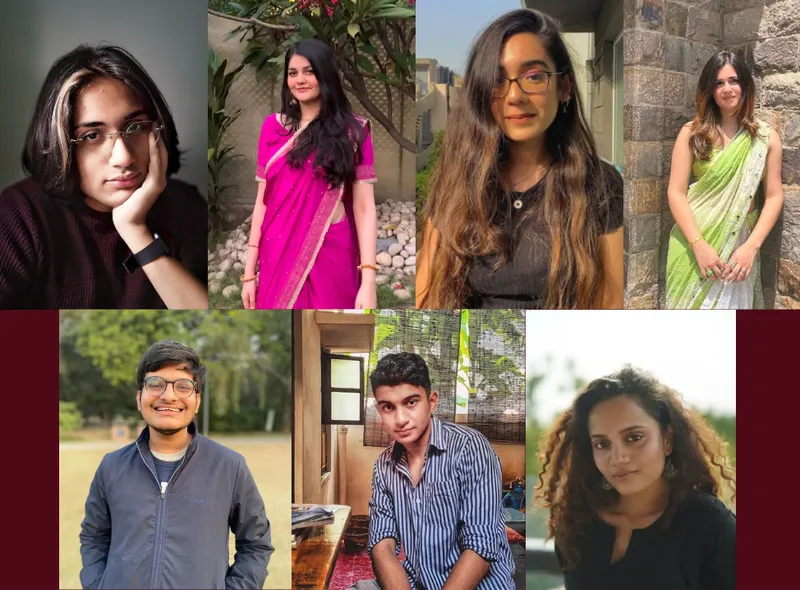Meet the 21-year-old using Instagram to reveal lesser-known parts of India's history
Eric Chopra, Co-founder of itihāsology, is a young aspiring historian who is using social media to educate people about India’s history and the diverse narratives that one finds while engaging with this discipline.
The telling of history can have a great influence on shaping current public policy and legal rights. And this is very much true for the queer community, as it is for many marginalised sections of society.
In fact, the landmark 2018 verdict of the Supreme Court that read down Section 377 cited the book ‘Same Sex Love in India’ by historians Ruth Vanita and Saleem Kidwai which demonstrated that homosexuality is not a western concept, and is a part of India’s history and diverse traditions.
From reading Same Sex Love in India, and through his supportive peers from the community, 21-year-old Eric Chopra, Co-founder of itihāsology, was able to find his own voice.

Team itihāsology
Talking about his experience while growing up, Eric says, “I am very fortunate that in my high school and college, I was surrounded by queer people. Our conversations resulted in a lot of learning and unlearning and we created a safe and inclusive space. Their acceptance and love were from a position of empathy and understanding. Thanks to this, I am able to fully express myself. This is not a universal experience though. For most queer people, this is not the reality.”
Eric observed that while it is crucial for people to learn their histories, there are many who do not wish to engage with the subject and also don’t recognise that it is based on interpretations and is complex and evolving.
That realisation propelled him to start Itihāsology as an Instagram handle in 2019 with an aim to promote conversations around histories that don’t feature frequently in mainstream narratives: histories of sexuality and gender, art and architecture, fashion and cinema, and emotional histories, among other aspects.
“We wanted to create an inclusive space where everyone feels represented and understands that history belongs to all of us and is not an exclusive territory reserved for the privileged.” says Eric.
Through much trial and error, and with the support of his Co-founder Kudrat Singh and the team, Eric has organically grown Itihāsology over the last three years into a 45,000 strong community of learners.
Beyond social media, the team also organises heritage walks, museum walks (primarily in Delhi), giveaways, Ask Me Anything sessions with historians and authors, and digitally publishes ‘the Itihāsology Journal’, which is reviewed by a panel of established historians. The journal serves as a platform for students to present their research work in this field.
Speaking about the team, Eric says, “We have people coming in with different interests. Like my interests are mostly in the ancient and mediaeval phases, specifically in histories of sexuality, art, and now, ghosts! Kudrat works mostly on modern Indian history. Due to the team, we were able to widen the scope of the content and we now touch upon various aspects of the past and explore a range of narratives.”
Each post is well researched and presented succinctly within 350 words, with images of the artwork or archival photographs, and all sources are mentioned for folks who’d like to learn more.
Itihāsology has found an active following among fashion designers, filmmakers, and book readers. “We have been collaborating with various publishing houses and host conversations that focus on freshly published history books”, he adds.
Eric recollects reading a message from a follower asking, “How do you not run out of history?”
“The challenge with our education is that,” he adds, “for most people Indian history ends at 1947 and everything after that year is conventionally taught in political science.”
It is important to understand that ‘History’ does not end and it has an impact on the fabric of our everyday lives. Similarly, talking about the lack of representation of queer narratives in how history is taught, Eric remarks:
“Does the absence of narratives on sexuality equal to an absence of sexuality in history? It does not. It’s an absence of research and an exclusion of sexuality from the dominant narrative.”
The need for historical empathy and engaging in the richness of the lived experiences of people from diverse cultures at different points in history is also a means to bring out more empathy in our society today. And the normalisation of history without consideration of complexities can be dangerous for democracy and human right.
Youth-led change-making initiatives like Itihāsology are helping contemporary society tackle what Chimamanda Adichie calls ‘the danger of a single story’. And Itihāsology is doing this by educating and empowering learners of all ages with the ability to empathise with people who do not fit into the dominant narrative of the time.
Edited by Affirunisa Kankudti
(Disclaimer: The views and opinions expressed in this article are those of the author and do not necessarily reflect the views of YourStory.)


![[Queer Changemakers] How Tweet Foundation is solving for Trans Rights and Livelihoods in India](https://images.yourstory.com/cs/5/f5a7f3304b1211e9b6645b8ae897d03e/Screenshot2022-06-27at7-1656339543279.png?fm=png&auto=format&h=100&w=100&crop=entropy&fit=crop)
![[Queer Changemakers] On being a queer teen in India](https://images.yourstory.com/cs/5/f5a7f3304b1211e9b6645b8ae897d03e/Screenshot2022-06-24at3-1656063462934.png?fm=png&auto=format&h=100&w=100&crop=entropy&fit=crop)




